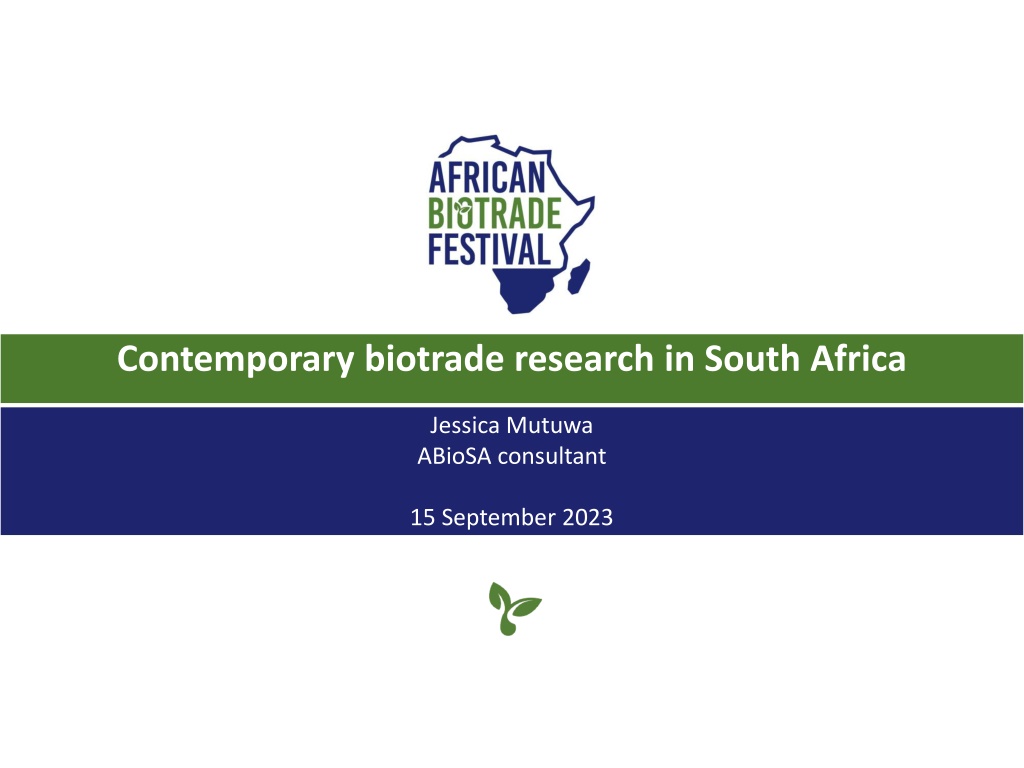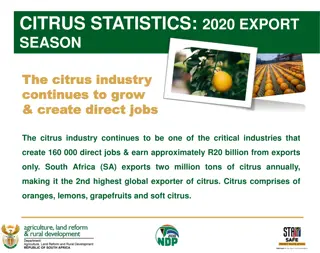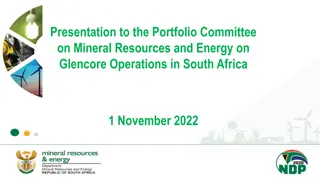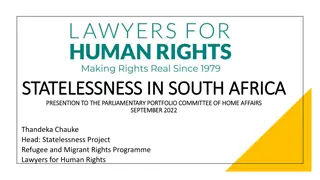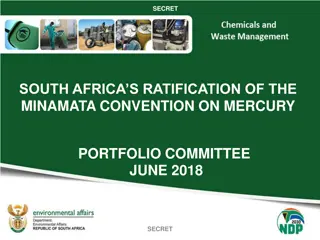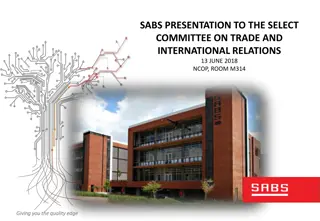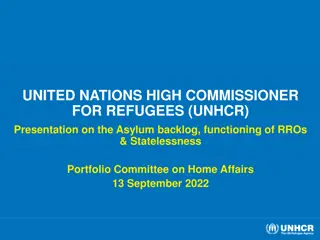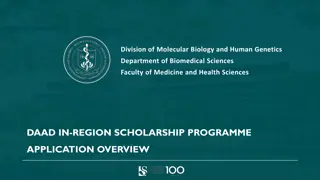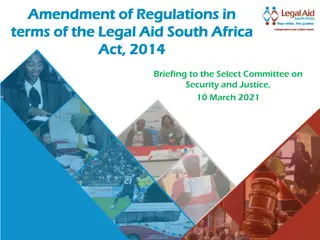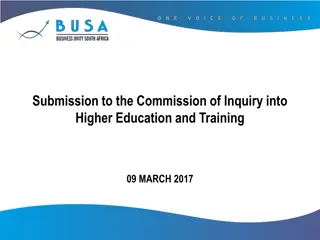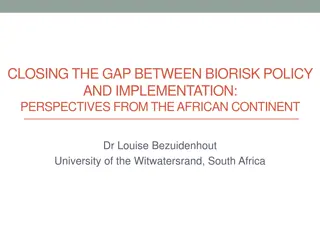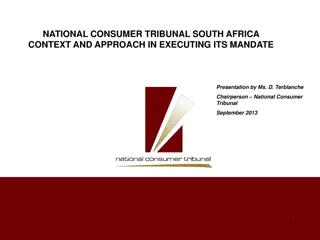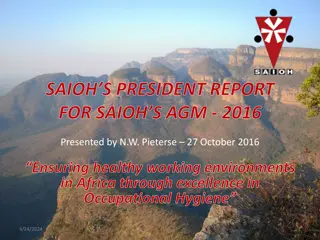Contemporary Biotrade Research in South Africa: ABioSA Project Overview
Explore the innovative ABioSA project in South Africa focusing on the development of a resilient gender-responsive biotrade sector. Funded by SECO and implemented by GIZ, this project aims to enhance market access for natural ingredients and products while promoting sustainability and fair benefit-sharing. Discover the research topics, postgraduate student presentations, and assessment criteria of this impactful initiative.
Download Presentation

Please find below an Image/Link to download the presentation.
The content on the website is provided AS IS for your information and personal use only. It may not be sold, licensed, or shared on other websites without obtaining consent from the author. Download presentation by click this link. If you encounter any issues during the download, it is possible that the publisher has removed the file from their server.
E N D
Presentation Transcript
Contemporary biotrade research in South Africa Jessica Mutuwa ABioSA consultant 15 September 2023
1. ABioSA project introduction Funder: Swiss state secretariate for econimic affairs (SECO) Implementer: Deutsche Gesellschaft f r Internationale Zusammenarbeit (GIZ) Govt partner: Department of Forestry, Fisheries and the Environment (DFFE) GIZ ABioSA phase II (2021 - 2024) objective Support the development of a resilient gender-responsive ABS-compliant southern African biotrade sector, through a systemic competitiveness approach to increase market access for value-added natural ingredients and products. Component 1 Component 2 Component 3 Developing and brokering of knowledge products, tools and processes as a vehicle for stakeholder engagement (micro-, meso- and macro- levels) Fostering southern African SMME innovation and growth with technical and financial support Support the strengthening the sector through sector- level technical and financial assistance (micro-level). (meso-level) 3
The African Biotrade research topics The use of southern African indigenous plants Conservation of biodiversity Sustainable use Fair and equitable sharing of benefits Sustainability, and Compliance
Postgraduate students presentations The modulation of intestinal cell inflammation with Rooibos extracts-Shana Cultivation practices and utilisation of Marula by smallholder farmers in the dry regions of Zimbabwe- Andrew The untapped medicinal value of honeybush in the management of diabetes-Kyle Aspects of the sustainability of the cultivated Honeybush tea industry in South Africa-Tafadzwa The only sustainable economy for Rooibos and Honeybush is green-Rhoda Adding value to Marula through modelling the extraction of valuable compounds-Trishen
Assessment 1. Background of the study The primary aspects of the project, including objectives, are clearly stated in a logical progression Does the background clearly state the biotrade/bioprospecting problem or question that the study will help to resolve? Are key background data or issues presented to set the stage for the study? Are the objective(s) of the study clearly stated?
2. Methods The materials and methods (what was done/details of the program) are clearly stated. Do the selected methods correspond with the purpose of the study and the research objective? Are critical definitions clearly stated, for example, case definitions, main exposure, etc.? Are the methods in chronological order?
3. Results/conclusion The usage, outcomes or findings are clearly stated, and any conclusions or claims are warranted. Conclusions are appropriate given the results and limitations of study design and methodologies. Are the results sufficient and adequately presented and organised to allow the reader to reach a conclusion? Does the conclusion answer the problem and objectives stated in the background? Are the findings and their interpretation consistent with existing knowledge in the sector?
4. Bioprospecting/biotrade significance The relevance of the project/research results in relation to the bioprospecting/biotrade sector Do the findings solve an immediate problem or build on existing knowledge, not simply repeat what is already known? Does this study have an obvious application to improving the bioprospecting/biotrade sector, such conservation & sustainable use, market & finance access, national & international legislation Is the study sufficiently sound (including clarity and strength of results) to serve as a basis for taking action?
5. Recommendation The study will contribute to the current body of knowledge in the respective field Are actions and/or control measures practical, and derived directly from study results?
Students benefits Successful students will have an agreement with GIZ to write articles/case studies that will be published on the ABS initiative website The best three presenters at the African biotrade festival will get an opportunity to attend international conference of their choice in 2024 (at the expense of ABioSA) ABioSA where possible will provide students with a networking platform to present their research Proof Africa Communications will conduct a capacity development communication and presentation training.
ABioSAs contribution to growth of the biotrade sector Marubini J Mutuwa MSc Ethnobotany University of Johannesburg Interest in biotrade sector: the creation of permanent and seasonal jobs for local people while boosting the value of biotrade in a sector which empowers women Role in Marula novel food study: search literature for references to food and seed oils use, to inform a scientific dossier for Marula Impact/benefit on future career: The study will impact future studies of regulatory approvals (e.g. safe for consumers and properly labelled) and then work within the industry to support the linkage between history of use and successful scientific dossiers for market access
